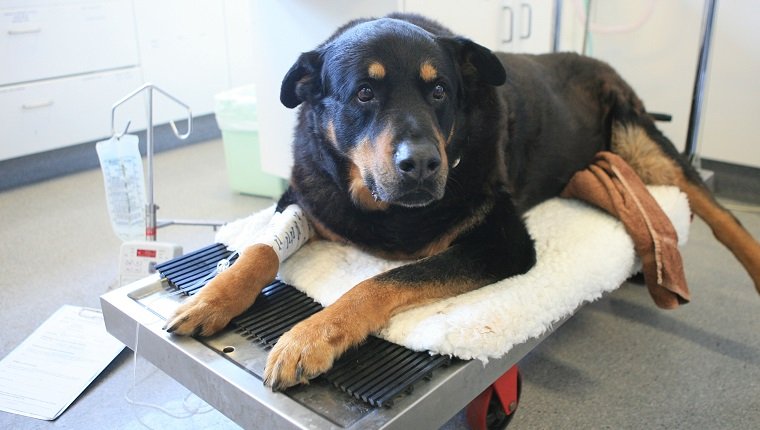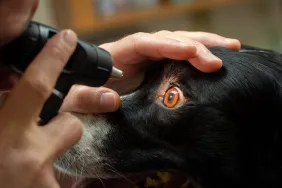Von Willebrand disease in dogs is a hereditary bleeding disorder. If left untreated, the disease can lead to excessive bleeding and even death. Although some dogs may exhibit no symptoms, others may spontaneously hemorrhage or experience prolonged bleeding after injuries.
The disease is caused by a deficiency of a protein that’s needed for blood to clot. This protein is called von Willebrand Factor (vWF), and it’s necessary to allow blood platelets to stick together and seal broken blood vessels.
Von Willebrand disease, sometimes referred to as vWD, is the most common inherited blood disorder in dogs — and in humans, for that matter. The condition appears in many breeds of dogs, but it’s more common in certain breeds and more severe in others.
If you suspect your dog may be suffering from von Willebrand disease, consult your veterinarian right away. They can form a proper diagnosis, advise you, and begin treatment.
Here’s what you should know about the symptoms, causes, and treatments for von Willebrand disease in dogs.
Symptoms Of Von Willebrand Disease In Dogs

Most dogs with von Willebrand disease show no signs or experience only mild symptoms, and even those usually disappear with age.
Some dogs go for years without the condition ever being discovered only for it to be found when they have surgery or experience an injury.
In severe cases, however, symptoms begin to appear by the time dogs are one year old.
Here are some common symptoms of von Willebrand disease in dogs:
- Spontaneous bleeding from the gums or mouth
- Spontaneous nosebleeds
- Excessive bleeding from the vagina during heat cycles
- Gastrointestinal bleeding (visible by bloody or black, tarry stools)
- Bleeding in the bladder (visible by blood in the urine)
- Skin bruises easily
- Excessive bleeding during surgical procedures such as spaying or neutering
- Prolonged bleeding of small wounds
- Prolonged bleeding after loss of baby teeth
- Excessive bleeding during nail clipping
- Anemia
Causes Of Von Willebrand Disease In Dogs

Von Willebrand disease is a hereditary condition in dogs passed down from the parents.
There have been reports of von Willebrand disease in over 50 breeds of dogs, though the disease appears most commonly in Doberman Pinschers. In a study, over 70 percent of Dobermans were carriers of the disease, although most showed no symptoms.
Even though Dobermans are the breed affected most often, they usually have the most mild form of the disease.
Chesapeake Bay Retrievers and Scottish Terriers are the most often affected by the severe form of the condition.
Treatments For Von Willebrand Disease In Dogs

There is no cure for von Willebrand disease in dogs, but the condition can be managed.
The goal of treatment is to control spontaneous bleeding and reduce the frequency of bleeding episodes. Parents of dogs who suffer from vWD should take care to make sure that their dogs avoid injury as much as possible. No roughhousing with other dogs, as even minor injuries can cause problems.
Dogs with the condition should also not have hard foods like bones or rawhide chews that can cause gum bleeding or cuts in the mouth.
In emergencies, dogs with vWD may receive blood transfusions or frozen plasma to stabilize bleeding. A vet may give the donor dog a drug called DDAVP to raise their von Willebrand Factor.
A dog with von Willebrand disease may also take this drug in non-emergencies. However, most vets do not recommend this on a regular basis, as DDAVP is expensive, and not all dogs respond to it.
Dogs with von Willebrand disease should not receive certain medications that have anti-platelet or anticoagulant properties. These include aspirin, NSAIDs, estrogen, antihistamines, ibuprofen, penicillin, certain tranquilizers, and more.
If the vet diagnoses your dog with von Willebrand disease, then ask about which medications to avoid.
Do you have a dog who has vWD? How do you manage the condition? Let us know in the comments below!









